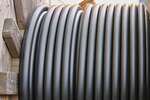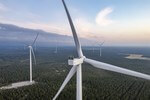02/09/2011
Product Pick of the Week - WAsP – the Wind Atlas Analysis and Application Program
So, we've been using WAsP for a while now, and we've come up with some great layouts optimised for energy production - however what is this pesty inflow angle that keeps coming up in the turbine manufacturer's siting reports? Is this something that really has to be considered?
The inflow angle is the angle (off the horizontal) at which the mean flow comes into the rotor, and we want to keep this as close to the horizontal as possible. It affects both the turbine loading, and the aerodynamic efficiency of the rotor (the power curve). As per IEC 61400-1 edition 3, the turbine manufacturers' design requirement for inflow angles are +/- 8 degrees (from the horizontal). These inflow angles are used as the design basis for the aeroelastic load calculations, so they really drive the fatigue loads. In practise, the more critical inflow angle is positive (coming up into the rotor), and this is usually the only one calculated by the turbine manufacturer as this is conservative. The reason for this is predominantly due to the rotor tilt being positive, and therefore a slight negative inflow angle (coming down into the rotor) can sometimes be a beneficial thing for fatigue loads.
Here are some outputs from WAsP Engineering 2.0 of inflow angles as it comes over a North-to-South ridge (wind from the west), it shows the positive inflow angle as it climbs over the ridge (green) and negative as it descends back into the valley (red). For this theoretical project, you can see the turbines right on the crest of the ridge where the flow is relatively neutral before it descends again - coincidentally this is where the high wind is and where we should be aiming for.
One of www.windfair.net's members - METEOTEST also offers the technology
ABOUT METEOTEST:
METEOTEST is a Swiss company offering services in the field of meteorology. It's wind energy division specializes in wind assessments in complex, mountainous terrain.
Sometimes it can't be avoided putting turbines in higher inflow angles, particularly for more complex sites where we are trying to optimise capacity, however in practise you should avoid exceeding inflow angles of +/- 4 degrees to minimise loads and maintain aerodynamic efficiency (power curve). If you exceed this you'll have to dive into more detail on the loading, and the accuracy of the power curve will be called into question (the manufacturer's power curves are also usually linked to a narrow range of inflow angles).
For more information on this article or if you would like to know more about what www.windfair.us can offer, please do not hesitate to contact Errol Stryker (Sales Manager Europe & North America) at es@windfair.us
www.windfair.net is the largest international B2B Internet platform – ultimately designed for connecting wind energy enthusiasts and companies across the globe!
The inflow angle is the angle (off the horizontal) at which the mean flow comes into the rotor, and we want to keep this as close to the horizontal as possible. It affects both the turbine loading, and the aerodynamic efficiency of the rotor (the power curve). As per IEC 61400-1 edition 3, the turbine manufacturers' design requirement for inflow angles are +/- 8 degrees (from the horizontal). These inflow angles are used as the design basis for the aeroelastic load calculations, so they really drive the fatigue loads. In practise, the more critical inflow angle is positive (coming up into the rotor), and this is usually the only one calculated by the turbine manufacturer as this is conservative. The reason for this is predominantly due to the rotor tilt being positive, and therefore a slight negative inflow angle (coming down into the rotor) can sometimes be a beneficial thing for fatigue loads.
Here are some outputs from WAsP Engineering 2.0 of inflow angles as it comes over a North-to-South ridge (wind from the west), it shows the positive inflow angle as it climbs over the ridge (green) and negative as it descends back into the valley (red). For this theoretical project, you can see the turbines right on the crest of the ridge where the flow is relatively neutral before it descends again - coincidentally this is where the high wind is and where we should be aiming for.
One of www.windfair.net's members - METEOTEST also offers the technology
ABOUT METEOTEST:
METEOTEST is a Swiss company offering services in the field of meteorology. It's wind energy division specializes in wind assessments in complex, mountainous terrain.
Sometimes it can't be avoided putting turbines in higher inflow angles, particularly for more complex sites where we are trying to optimise capacity, however in practise you should avoid exceeding inflow angles of +/- 4 degrees to minimise loads and maintain aerodynamic efficiency (power curve). If you exceed this you'll have to dive into more detail on the loading, and the accuracy of the power curve will be called into question (the manufacturer's power curves are also usually linked to a narrow range of inflow angles).
For more information on this article or if you would like to know more about what www.windfair.us can offer, please do not hesitate to contact Errol Stryker (Sales Manager Europe & North America) at es@windfair.us
www.windfair.net is the largest international B2B Internet platform – ultimately designed for connecting wind energy enthusiasts and companies across the globe!
- Source:
- WAsP Engineering based in Denmark / METEOTEST
- Author:
- Posted by Trevor Sievert, Online Editorial Journalist
- Email:
- office@meteotest.ch
- Link:
- www.meteotest.ch/...
- Keywords:
- WAsP – the Wind Atlas Analysis and Application Program, wind energy, wind power, wind turbine, onshore, offshore, windmill, www.windfair.net, Trevor Sievert, ECA


























